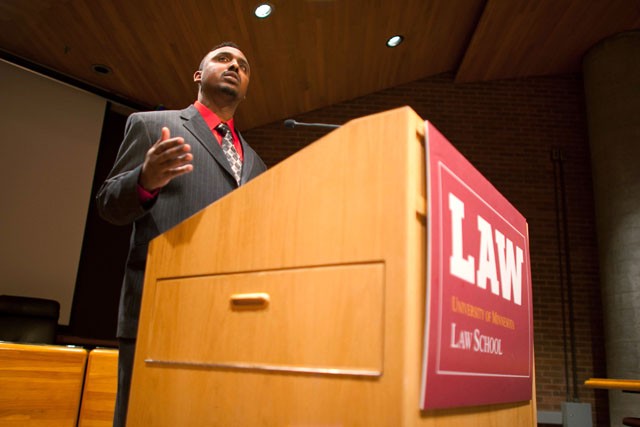Wounded protesters and the remnants of destroyed property are not the only things that will need to be mended when the revolution in Egypt finally transitions to stable governance.
The changes brought by new leadership âÄî and how that affects the countryâÄôs residents âÄî will also need to be pieced together.
ThatâÄôs part of what Abdulwahid Qalinle, an adjunct professor of law at the University of Minnesota, hopes a new venture at the law school will accomplish.
The Islamic Law and Human Rights Program, a subset of the schoolâÄôs Human Rights Center, opened Friday. Qalinle will head the program, which will share resources, including faculty and fellows, with the larger human rights center.
âÄúOur role in what is unfolding in Egypt is to shed light on the intersection of Islamic law and human rights,âÄù Qalinle said. He referenced the potential for the Muslim Brotherhood, an opposition political group currently prevented from full participation in government by Egyptian President Hosni Mubarak, to implement some elements of Islamic law, or Shariah, if elected to the government succeeding the president.
The program will blend academic and advocacy efforts. While it will sponsor traditional ventures, including research and conferences, it will also offer training and internships and partner with groups to address community issues.
Kristi Rudelius-Palmer, a co-director of the center, said the program was conceived in response to those local needs. Certain prescriptions of Islamic law, which range from prayer to diet, are difficult to square with the policy intricacies of a predominantly Christian nation.
One challenge is for local schools to provide time for Muslim students to pray and to offer Halal-certified menu options at cafeterias. Combined with the challenge of adjusting to a new country âÄî Minnesota has the largest Somali immigrant population in the nation âÄî the strain on young Muslims is pronounced.
âÄúHow do you make sure all of the students are feeling valued in the communities?âÄù Rudelius-Palmer asked.
Finance is another area. Shariah forbids usury, or charging interest on loans. To allow debt financing while still complying with the law, a lending institution signs a joint-ownership agreement with a family or business, owning the majority of the property, which the borrower buys back over time.
âÄúIt is a partnership over a lender-borrower agreement,âÄù said Hussam Qutub, spokesman for Guidance Residential, the largest Shariah-compliant home lender in the United States. Guidance was founded in 2002.
That market is growing as more American Muslims, many of whom are first-time homebuyers, look to purchase. Qutub said that since American firms began offering Shariah-compliant lending, $2.5 billion in loans has been produced, adding that the potential of the market is âÄúbetween a $20 [billion] and $40 billion opportunity.âÄù
Islamic-American business owners have less recourse for their capital needs. Agencies such as MinneapolisâÄô African Development Center offer compliant loans to small businesses. A lending officer at a similar center said they deal in loans that are less than $35,000 âÄî larger sums are not available.
Last week the ADC received a $40,000 grant from the city of Minneapolis to boost its microlending efforts.
âÄúMy mom keeps asking me why we have these loans,âÄù said Majdi Wadi, only half-jokingly referring to his businessâÄôs use of conventional loans. Wadi is the CEO of Holy Land, the Minneapolis-based restaurant and grocery chain. He said existing programs donâÄôt offer the kind of money he would need for his business.
âÄúIf any financial institution announced tomorrow that they would start complying with Islamic law,âÄù he said, âÄúI would be the first to sign up.âÄù
The challenge of reconciling Islam and civil law, Anglo-American or otherwise, is not a problem unique to that religion, Qalinle said. He likened the restrictions imposed by Islamic law to the denunciation of homosexuality or the opposition of a womanâÄôs choice to an abortion by some Jewish and Christian groups.
âÄúThe relationship between any religion and [human] rights can be problematic,âÄù Qalinle said, âÄúsince it involves negotiation between that which is secular and of human origin and that believed to be from God.âÄù
That negotiation leaves plenty of room for misapplication, particularly in the treatment of women by the governments of some predominantly Muslim countries, said Outeiba Merhebi, a fellow of the new program.
âÄúIslam does not oppress women,âÄù she said. âÄúThe only reason that women in todayâÄôs Islamic world do not have adequate rights is not because of Islam but because of [its] incorrect implementation and interpretation.âÄù
Those select misapplications are often the only thing an American knows about Islamic law, said Rep. Keith Ellison, D-Minn., who spoke at the programâÄôs opening Friday. He lamented that, âÄúthe term âÄòShariah lawâÄô is tossed around like a political football sometimes.âÄù
Just 37 percent of Americans express a âÄúfavorable opinionâÄù of Islam, and 26 percent admitted to âÄúfeelings of prejudiceâÄù against Muslims, according to a September 2010 poll conducted by ABC News and the Washington Post. Three out of 10 Americans âÄú[think] mainstream Islam encourages violence against non-Muslims,âÄù a figure unchanged since 2003.
Ellison applauded the University for supporting a research center despite negative public opinion.
âÄúIt is commendable when the pursuit of that knowledge is done even in the face of critique,âÄù he said. âÄúWeâÄôre shining light on a subject where there has been darkness, misinformation and misrepresentation.âÄù
Program highlights Islamic law
The new program hopes to address issues in Islamic communities.

Image by Anthony Kwan
Director of Islamic Law & Human Rights Program Abdulwahid Qalinle speaks at the Launching Ceremony for the Islamic Law & Human Rights Program Friday. The program engage University of Minnesota students on current human rights and Islamic law issues.
Published February 7, 2011
0

